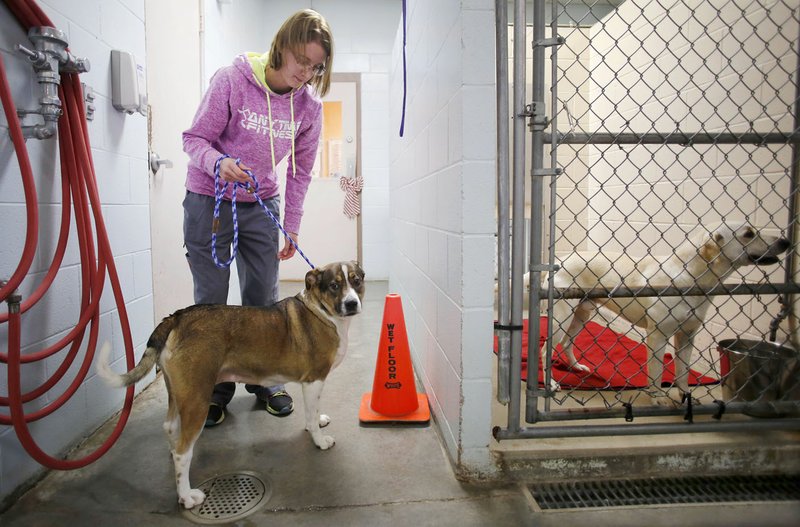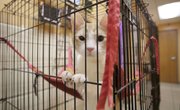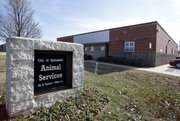SPRINGDALE -- Scarlett and Ruby made themselves at home. They steal treats and wreck the yard, but they also give slobbery kisses and cuddle on the couch. The Hignite family love the two basset hound mixes adopted last summer from the city Animal Shelter.
Kobi, a once happy mutt, showed signs of kennel stress after several weeks in the shelter last month.
Special election
Springdale residents will vote on a $200 million bond issue that would pay for projects in five areas. The sixth question on the ballot asks voters to renew a 1 percent sales tax to pay the bonds. The renewal must pass for any of the projects to be funded.
Estimated costs and projects are:
• $71.4 million for street improvement.
• $47.4 million to refinance debt.
• $40.8 million for a criminal justice center and renovate the city administration building.
• $19.4 million for parks and trails.
• $16.4 million for three fire stations.
• $5.2 million to replace the animal shelter.
Source: Staff report
Editor’s note:
This is the first in a six-part series examining the proposed bond issue Springdale voters will decide Feb. 13 and the projects it would fund. Visit nwaonline.com for this and future stories.
"Kobi, you're going to get adopted," promised Courtney Kremer, city director of animal services, as she stroked his fur. Kobi wagged his response.
Construction of a larger animal shelter is one of five projects planned if city voters approve a $200 million bond issue. The special election is Feb. 13. The bonds would be paid with revenue from the renewing a 1 percent sales tax.
"The existing shelter is too small for the community," reads the summary of a needs assessment, which encourages the new construction. The city contracted with Shelter Planners of America in Arlington, Texas, for the assessment and received the report in November.
Kremer and Mayor Doug Sprouse used the report to determine the features and $5.2 million cost of a new shelter.
It would be built at J.B. Hunt Park with a groundbreaking likely in late 2018 or early 2019, Sprouse said. The question on the ballot reads renovate or construct, but Sprouse said he's ruled out renovation.
"In the past, it was customary to locate animal shelters at out-of-the-way places on the least expensive properties, like industrial areas," reads the needs assessment.
"Today, it is recognized that locating shelters in high-visibility locations not only increases visitors and the number of pets adopted and returned to owners, but also reduces the need for animal euthanasia and helps build public awareness and community goodwill. A good location can increase adoption by 100 percent."
PEOPLE AND PETS
The 5,500-square-foot shelter opened in 1994 and expanded in 2013 into a brick building behind it. The shelter served 2,500 animals in 2016.
The assessment report noted the national average of animals received at local shelters annually is 3 percent to 4 percent of the city population. The report projects 108,285 residents in 2026 with animal intake of 3,261.
By 2036, the population estimate climbs to 138,088 with an animal intake of 4,159.
"In the needs assessment, we looked at 10 years, but you design for 20 years," Sprouse said.
Roughly 40 dogs filled 24 kennels Friday, Kremer said, and about 40 cats awaited adoption in 28 cages. Ten more dogs awaited space on the adoption floor. "If they're not seen, they're not adopted," she said.
The needs assessment recommends housing for 76 dogs, a 28 percent increase, and 86 cats, a 25 percent increase.
That back building housed the city's original animal shelter and was opened to provide more space, Sprouse said. It also serves as a makeshift isolation unit for sick animals and keeps animals ordered held by the courts.
"It was a huge lifesaver, opening up 18 kennels," Sprouse said of the back building. "It really bought us some time."
The Springdale shelter adopted out 1,207 animals in 2016, returned 799 to their owners and euthanized 190 -- about 10 percent, Kremer estimated. Most of those animals were sick or ordered destroyed by the courts. The euthanasia rate is down from about 51 percent in 2011, when Kremer became director.
"We're doing good things here, but we can use some changes," Sprouse said.
"Some of today's best practices weren't known when the building opened," he said. "It was modern for the 1990s."
DESIGNED FOR DOGS
"Animal shelters of today are no longer just warehouse structures with cages lined down the wall," reads the needs assessment. "Shelters are very specialized buildings, which are more like hospitals and shopping malls than warehouses in construction. A high level of quality is needed if the facility is to be able to keep animals healthy and to hold up under heavy wear."
Modern shelters include central washing equipment, automatic animal watering systems, individual kennel floor drains, fresh air with heat exchangers, heated kennel floors, noise control systems and long-lasting, easily disinfected wall and floor finishes, according to the assessment.
The new shelter also would include the air control and drainage systems needed to minimize the spread of disease.
The dogs in the shelter's adoption pens sound a chorus of barks when anyone enters the room.
"They all want to be your best friend," Kremer said. "But it's loud, and you can't hear a thing."
Dogs can become overwhelmed by the noise, and stressed by looking at dogs in kennels across from them, Kremer said. Long-term kenneling can adversely affect a dog's or cat's behavior, causing neurotic behavior such as pacing, spinning and aggression, according to Shelter Planners of America.
The layout of the dog room also affects efficiency, Kremer said. Staff members must put each dog on a leash, walk it out the back door and around the side of the building to concrete dog runs to clean the kennel.
"Every day, 30 dogs," Kremer said. "Wash, rinse, repeat."
A new building would have indoor-outdoor runs for each dog, providing a space where a dog could be isolated on one side while staff cleans the other, she said.
Kremer listed other needs: organized storage and laundry areas, additional "meet and greet" rooms and an outdoor area where volunteers and potential adopters can "throw a ball with a dog" and for obedience training.
"The dogs don't show well," she said. "They need to be out of the kennels."
"I would probably not give a very good impression to people if I were in a cage," Sprouse added.
Kremer also hopes for a "catio" indoor-outdoor playroom for the cats, "so you can see them in more natural behavior doing things cats are supposed to do."
Cities throughout Northwest Arkansas are adding space to their animal shelters.
In Fayetteville, the dogs got new kennels in 2016 and the puppies moved into what used to be office space. The cat space was expanded last year. This year, the shelter is slated to get a new air-conditioning system and LEDs. Donations made the new digs possible.
The Washington County shelter has a new cat enclosure, concrete outdoor dog kennel runs with awnings and a supervisor's office. Those projects used money from a bequest, Director Angela Ledgerwood said.
The Centerton Animal Shelter has 18 kennels, but is in the process of expanding to 60 with additional dog runs outside, said Mayor Bill Edwards.
ROOM TO GROW
The 2½- to 3-acre shelter would be on city property on the south side of the southeast entrance of J.B. Hunt Park on Pump Station Road, Sprouse said.
"We will have ample room for the future," he said.
The location promises many advantages, Sprouse said.
The shelter on Randall Wobbe Lane lacks parking and has no room for expansion. The city's Public Works facility, which surrounds the shelter, needs the space, he said.
"The J.B. Hunt location is more visible," added Melissa Reeves, city spokeswoman. "People and families are out at the park. The shelter's not hidden."
"There will be more places for volunteers to take animals for visibility and adoption events," Kremer said.
Preliminary design would be the next step.
"We spent money on a needs assessment, but we are waiting to spend any more money until the bond issue passes," Sprouse said.
The $5.2 million proposed cost is a maximum amount, based on what other shelters around the country are spending per square foot, he said.
"If we can do it for less, we will," he said. "And if we need to pare back, we will."
A few posters on the Live Springdale Facebook page balked at the proposed cost when it was announced, but no one responded to requests for interviews.
"I'll support the bond issue," said Marjay Hignite. "I always support a city bond issue. Springdale is growing and changing so much. We have to keep up with the infrastructure to keep Springdale the special place we know it is."
NW News on 01/07/2018



